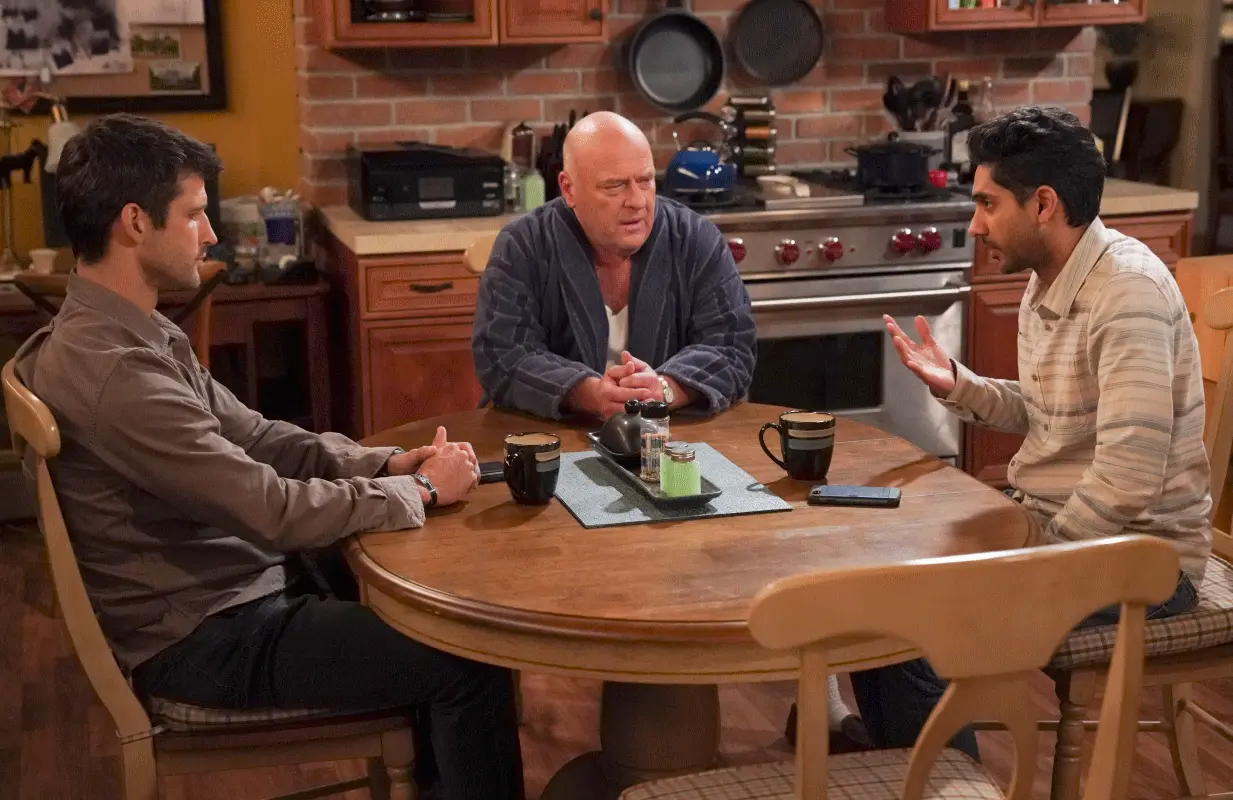A Special Episode Highlights Why United States of Al Is Such a Special Show
-
 Parker Young, Dean Norris and Adhir Kalyan in a scene from the Season 2 premiere of United States of Al. (Photo: Michael Yarish/CBS)
Parker Young, Dean Norris and Adhir Kalyan in a scene from the Season 2 premiere of United States of Al. (Photo: Michael Yarish/CBS)Chuck Lorre is an unapologetic Hollywood liberal with a Borscht-belt sense of humor and a damn fine ear for what makes the masses laugh. He's our greatest impresario of primetime comedy, having already fronted a dozen different hit shows — twice as many as Norman Lear had — with more on the way. And tonight, his gentlest sitcom, United States of Al, is set to move Afghanistan from the news side of television to the entertainment side. It isn't an especially entertaining half hour, but you won't want to miss it.
Network sitcoms, with their 22-episode seasons, are unforgiving to anyone who doesn’t show up every day and feed the furnace. Not only has Lorre overseen some of the most popular sitcoms of his time, he's championed the work of talented writers who have mined comedy from the most unlikely of quarries — sobriety culture (Mom), aging and mortality (The Kominsky Method), international relations (Bob Hearts Abishola) and chronic illness (B Positive).
Arguably, though, Lorre’s biggest flex has been United States of Al, which tiptoes into the emotional minefield of U.S.-Afghan relations. For an extra degree of difficulty, the lead is a devout Muslim living as a fish-out-of-water in the heart of Christian America. The show launched ahead of the U.S.’s announced withdrawal from that country, and the second season is premiering this week in the aftermath of the government’s spectacular collapse and takeover by the Taliban. But more on that shortly.
Two Big Bang Theory writers, David Goetsch and Maria Ferrari, came up with the idea for United States of Al after reading about the plight of Afghan interpreters who had been promised safe emigration to America but were stuck in Afghanistan. The show revolves around the friendship of Awalmir — Al for short — and Riley, a Marine who became tight with Al while they were stationed together in Afghanistan. Al is one of the fortunate ones, an interpreter who got safe passage to America. Now he has to get used to life in Ohio, but so does Riley, who’s suffering PTSD and is breaking up with his wife Vanessa (Kelli Goss), with whom he has a precocious sitcom child named Hazel (Farrah Mackenzie). The guys are currently living with Riley’s dad (Dean Norris, aka Breaking Bad’s Hank) and sister (Elizabeth Alderfer) in a big old sitcom house.
Among professional TV watchers, there’s been a general acknowledgment that United States of Al is well-intentioned, has a good heart, blah blah blah, but isn’t exactly a knee-slapper. Others have been less charitable, condemning the show for hiring a South Asian actor, Adhir Kalyan, to play Al instead of an Afghan actor, and for having too many white people in the cast, including a Marine who serves as the dreaded “white savior.”
To be sure, the humor on United States of Al is pillow-soft by Chuck Lorre standards. But there are four Afghan writers and producers on this show, so if that’s how they roll, I’m fine with it. Another producer on the show is Reza Aslan — one of our sharpest popular observers of the intersectionality between Christianity and Islam — and he has said in interviews he’s been trying for years to get a believable, three-dimensional Muslim into a network sitcom. I think they’ve succeeded in that. As for Riley (Parker Young) playing the “white savior,” Season 1 offered abundant proof that with his rage and alcohol problems, Riley is going to have to work hard just to save himself.
In sum, United States of Al is very human, sufficiently humorous and decidedly different from any mainstream comedy I’ve ever seen. I liked it a lot even before I saw the second season’s astonishing premiere, an episode torn from the headlines in a way few shows have ever attempted: Al’s sister Hassina (Sitara Attaie) is trapped in Kabul as Afghanistan is falling, and Riley taps into his Marine network to get her out. What makes it especially powerful is we never see Hassina (except in flashbacks). We only hear her pleading, desperate voice on Al’s phone as she tries to find a way to the Kabul airport before the Taliban tracks her down.
Behind the scenes, the cast and crew were involved in helping show consultant Chase Millsap, a military vet active in No One Left Behind, a nonprofit helping interpreters get out of Afghanistan. Kalyan and Young taped a PSA on behalf of No One Left Behind that will air during the show. There aren’t too many jokes in the entire episode (two of them are prostate jokes — Lorre knows his audience), but they aren’t missed. This is a thoughtful, emotional half hour and a great entry point to a comedy with its own distinct voice.
The season two premiere of The United States of Al airs Thursday October 7 at 8:30 PM ET on CBS and Paramount+.
People are talking about The United States of Al in our forums. Join the conversation.
Aaron Barnhart has written about television since 1994, including 15 years as TV critic for the Kansas City Star.
TOPICS: United States of Al, CBS, Adhir Kalyan, Chase Millsap, Chuck Lorre, David Goetsch, Dean Norris, Elizabeth Alderfer, Farrah Mackenzie, Kelli Goss, Maria Ferrari, Parker Young, Reza Aslan, Afghanistan War, Muslim Americans and TV